Each lactating woman knows that she must adhere to a special right and balanced diet, designed not only to enrich, but also to protect the fragile organism of the baby from the problems. The baby feeds on my mother's breast, which means that she receives the substances necessary for development with milk. But at the same time it risks getting hurt if nursing mothers are careless with food.
Science has long established that all the vitamins, micro and macro elements that are necessary for the health of both the nursing mother and the baby, are better absorbed from food, rather than from synthetic vitamins, no matter how expensive they are. Therefore, it is better for a mother to eat a handful of berries or a few fruits than a synthetic vitamin.
Fruit is a must on the mother's table. When the baby grows up, he will certainly try all this yummy, and while he gets to know them through the mother's milk. So do not miss the moment and try to slowly fruit with breastfeeding. The only question is what kind of fruits are allowed in the GW, which will really benefit and will not harm little children. There are fruits that pediatricians recommend to consume literally from the first days of life baby, and there are some that they do not advise buying up to a year. But first, let's see why it is so important for nursing mothers to consume enough fruit.
The benefits of eating fruits and berries for nursing mothers
All nine months of bearing a baby the woman spent her body's resources on growing the fetus. And after giving birth, useful substances were consumed in breast milk to feed the baby. As a result, in the body of nursing mothers there are not so many substances that support their own health and beauty. Replenish the missing will help the right food, vegetables and fruits. When feeding crumbs, they should be eaten regularly, paying special attention to precautions when using them.
Fruits should be on the table at the nursing mother. However, they should be consumed cautiously and in moderation
Berries, fruits will support the immunity of a nursing woman, since these foods are rich in vitamins, trace elements.
- Increase hemoglobin will help iron.
- Support the bone system of moms during calcium lactation.
- It will improve blood circulation in the brain, folic acid or vitamin B 9 will support its activity.
- Cope with cramps and improve the work of the muscular system is magnesium.
- The heart muscle will be supported by potassium.
- Lower cholesterol and improve metabolism of pectin.
- To help eyesight and the bone system, phosphorus will come.
- Immunity will strengthen beta-carotene.
Problems with the consumption of fruit in breastfeeding
Women with breastfeeding are mostly afraid of two problems: allergic reactions and troubles with the baby's gastrointestinal tract. And they are right. Let's take a closer look at each of these problems, and what fruits will not harm moms.

Eating fruits with a nursing mother can lead to two problems: allergies and colic
Allergy
It should be understood that an allergic reaction in a child can occur on any product. However, there are more allergic products, and there are less.
- In the diet it is better not to include fruits of red and orange colors: the pigment, which gives such fruits a bright color, causes allergic rashes and stains. The exception is a red apple, but it is better to peel it.
- With caution should try strawberries, cherries, cherries, strawberries and raspberries. With them you need to wait. Exception - white or yellow cherry, which can be eaten from the first day of feeding.
- Many lactating women are very interested in whether you can eat a watermelon. Indeed, this fruit is loved by many. By itself, watermelon is not allergic, although it has a red flesh. The problem can arise because of other nuances: watermelon is often improperly grown or grown with the use of harmful chemicals and fertilizers. But if you are sure of the quality of watermelon, then there should not be any problems. Especially this fruit is able to increase lactation due to its "watery", and it improves metabolism.
- Completely eliminate citrus fruits. These fruits, because of the high concentration of vitamin C, can cause allergy in a large number of nursing mothers. One lemon of lemon per tea is forbidden.
Important: remember that allergic products are dose-dependent. You can eat two apples and a handful of strawberries, and the kid will have nothing. But if you go over with the number and eat a lot of fruits at a time, then the allergy will not take long. Here you should be very careful.
Problems with the stomach
Problems with the abdomen of the baby are in the first three months after childbirth. Especially one should be careful with new products, and with fruits in particular, in the first month of life of the baby. Breastfeeding imposes large restrictions on women during this period. The digestive tract of the baby still works unstably, crumbs can be tormented with gazicks and colic. If during this period Mom will not keep the right diet, but will eat as it is, it will easily aggravate the problem.
Causes of colic
- In any fruit and berries contains a large number of sugars - glucose, fructose, etc. When these sugars (carbohydrates) enter the intestine, they cause fermentation, respectively, increase colic. Therefore, nursing mothers need to pay attention to the amount of sugars in foods. The champion in the content of carbohydrates is grapes. Therefore, if the child is in a period of active colic, then it is better not to eat grapes.
- In some fruits and berries contains a large number of acids (malic, ascorbic and many others). These acids are useful, but they cause the production of gastric juice and intestinal contraction, and this can all stimulate colic. The more acidic a fruit, the more acid it contains. With such a fruit you need to be more than careful. This is another reason why you can not lean on citrus fruits during the first month of feeding.
Many sugars contain flat peaches, nectarines, apricots and pears - more than 10 g per 100 g of product. In some cases, you should wait for up to 3 months and only then have them.
Fruits and berries in descending order of the amount of sugars
- plum;
- peach;
- raspberries;
- kiwi;
- currant;
- blueberry;
- strawberry;
- strawberries;
- melon;
- blackberry.
Choosing fruit
The choice of fruit for lactating women should be based on the following criteria.
Region of growth
Today on the shelves we see a huge number of fruits as familiar and familiar to us from childhood, and exotic. Nursing mother should not pursue exoticism, it is better to make a choice in favor of our domestic fruits, and there are those that grow in the region where the person was born and lives. It should be delayed with citrus, mango, papaya, pineapple and some other foreign fruits.
There is one more reason why you should not try "foreign" products (at least in the first month of your baby's life): transportation of these fruits is long, which means that it is unlikely to do without special chemicals that provide longer-term storage of fruits.
However, you do not need to give up exotic fruits. The fact is that the child needs to get acquainted with food components, and he does it through milk. If the mother will slowly be eating different fruits (including "non-native"), it will be easier for the baby to transfer the acquaintance with them during complementary feeding.
In addition, in some fruits there are vitamins that are rarely found elsewhere. For example, vitamin E in kiwi. Therefore, they need to eat, but not before 4 months.

Fruits choose according to the season of maturation. An important nuance is the region of their growth
By season
Most fruits ripen in a certain season at a certain time, and only then they are most useful and tasty. You should not eat strawberries in winter, since it was hardly grown in your region, most likely it was brought from another country. It's the same with other products.
Seasonal fruits that are allowed for GW:
- May-August: cherry - white or yellow. Trying is allowed from the first day of feeding.
- June-September: nectarines, peaches, figs. Try with caution, at first on a little bit, to follow the reaction of the newborn's body.
- October-December: persimmon and pomegranate. Persimmon is recommended to be administered only when the baby is 3 months old, and the pomegranate is injected in a month of feeding in the form of juice. 30 ml is enough to start.
These are all the allowed fruits that you can consume without much fear. But in fact, you can eat and other fruits that you want, just a little, adhering to the measure.
Fruits that mum can eat in the first month of lactation
- Apples: to start better with green varieties. In the first month, raw apples are well baked in the oven.
- Pears: despite the fact that pears are allowed during breastfeeding literally from the first day, they have a lot of fiber, so in some cases, moms abstain from them for up to 3 months.
- Apricot: stimulates the immune system, is rich in useful substances, regulates the woman's chair.
- Plum: has a laxative effect, so it is especially recommended for constipation of both mother and baby.
- Banana: one of the few fruits that you can safely eat on breastfeeding. Bananas are a source of potassium, perfectly charged with energy, can replace or become the basis of a delicious dessert.
- Kiwi: contains vitamin E and many other vitamins, is a natural antioxidant. It is not necessary to refuse it, but since it can cause allergies, it is necessary to control the amount of fruit eaten - for breastfeeding women it is no more than 1-2 fetuses a day.

It is worth noting that after 3 months of breastfeeding mothers, you can gradually try everything
Important criteria for fruit consumption
- The introduction of products during breastfeeding should be carried out gradually: no more than one fruit every three days. If the fruit is large, then eat half or quarter of the fruit.
- It is necessary to try in the morning so that there is time to follow the child's reaction. When allergic manifestations, the fruit should be "forgotten" for 3-4 weeks.
- If problems with allergy and colic did not arise, then the daily intake of fruit is equal to 200-300 g per day.
- It will be superfluous to recall that fruit should be washed thoroughly before use, preferably with a special gel.
- If the fruits are thermally processed, for example, bake apples, plum pears or apricots in the oven, then the level of allergy decreases.
- In order to breastfeeding mothers could eat fruits not in season, they are well-frozen for the winter. Prepared in the period of natural ripening fruit will be safe for moms and their babies.
Listen to the body
We examined many criteria that should be used when choosing and consuming fruits, but the main reference point is the very organism of a woman. He will tell you what he needs at this time, the nursing mother needs only to listen to herself and understand what she is pulling at. The desire of this or that product is an indicator that something is missing in the body. The woman's organism will "tell" what fruits are required, and maybe.
For a newborn child, there is no wide range of options for feeding. The best among them is still considered breast milk. With its help the body can develop qualitatively and receive the whole necessary spectrum of vitamins and minerals. For a woman, the main thing is to carefully select a diet. That is why the question arises as to what berries can be given to a nursing mother.
According to dieticians, a person will always be healthy if he eats natural food. When breastfeeding, there is a list of banned and approved foods. Fruits, vegetables and berries should be treated with care. It is also advisable to find out which ones you can eat. With moderate consumption of berries are useful in HS.
The first month after childbirth
During this period, the body of a woman more than ever needs vitamins and minerals. Specialists on HW strongly recommend to exclude from the diet the following berries:
- red and orange colors;
- grapes;
- plum;
- products that are heavily digested and long delayed in the gastrointestinal tract.
Nursing mothers a day are allowed to eat no more than two hundred grams of fresh berries. They can also be included in freshly squeezed juices. It is advisable that there are only those plants that are currently considered seasonal.
From exotic options refuse immediately, because their impact on the body is difficult to predict. Vendors are often sprayed with special chemical compounds that help preserve the fruit during long transportation. The quality of such a product is being questioned.
A newborn can also experience an individual intolerance and an allergy. Such negative reactions are often inherited.
Introduction of berries in the diet
After the baby is one month old, it is possible to introduce new berries into the woman's diet. The newborn's body gradually adapts to the external environment and is able to correctly perceive even more food. In the future, he will have to eat the usual food, which consists of his parents' meals.
Milk nursing mother - the first source of information about the outside world. Proper nutrition contributes to the production of the required amount of antibodies.
When breastfeeding, gradually introduce new fruits, vegetables and berries. Portions should be minimal, and until the next use should wait a few days. If you notice a negative reaction of the baby, a bad stool or a rash, then the test product should be discarded. In any case, it is important to use a new product in limited quantities.
Products of questionable quality in general is best not to use, because they can have a negative impact not only on the mother's body, but also on the child.
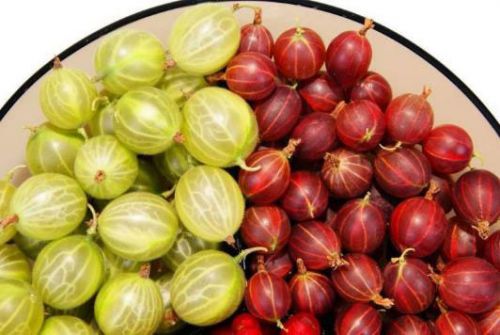
Gooseberries are a product that does not cause allergies
Strong allergens
- all citrus fruits;
- red berries such as strawberries, strawberries, raspberries;
- sea-buckthorn and its oil;
- exotic berries.
A woman should closely monitor the reaction to a particular product of her body. If the stomach pulls or it hurts even from a small amount of the product, then it is not allowed to continue eating. It should be well controlled their desires, because diathesis can arise even from a small amount of allergenic berries.
Allowed berries during GW
It is useful for the nursing mother to have apples of green and yellow color. They help regulate intestinal motility. The fruit is best eaten without skin, in which case the probability of an allergic reaction is reduced to zero. What berries and fruits can be eaten in moderation during breastfeeding:
- Peach contains a large number of vitamins, phosphorus, iron and potassium. Regular use of the fetus improves the stool and relieves the pain that may occur in the intestine.
- Watermelon is necessary for qualitative cleansing of the kidneys. With its help, metabolism is accelerated. The liquid in turn increases the amount of lactation. Choose only fresh berries, which do not include chemicals.
- Plum is advisable if there is constipation. However, it is not recommended for breastfeeding to eat it raw, because it affects the operation of the intestines too much. When lactating in a diet, it is advisable to include a dried version.
- In the pear is a large amount of folic acid. The fruit is quite difficult for the digestive system. To accelerate the digestion it is recommended to peel and eat the pear along with the porridge. Positively on the body as a whole, and compote of the fruit. The mother should closely monitor the reaction of the baby and abolish the use of the product in the presence of colic in the child.
- Apricots strengthen the immune system, because they include a large number of beta-carotene. Fetal macronutrients are necessary to strengthen the muscles and bones of a person.
- Feijoa is considered an exotic product. It becomes ripe in late autumn. Berry is rich in vitamins and iodine. It can be used as a substitute for citrus fruits. Helps the nursing mother improve the immune system.
- A large number of antioxidants are contained in cherries, gooseberries and currants. Products are allowed for breastfeeding, since they can cause allergy only in case of individual intolerance. When they enter the diet, you should closely monitor the reaction of the baby.
- Banana is rarely the cause of allergies. The only drawback is that it's hard to guess what the fruit was processed for to extend the shelf life. Categorically not recommended is a product that contains toxic insoluble impurities.
- Enrich the body with iron will help a grenade. It should be eaten with a lack of hemoglobin. It is used to strengthen the resistance of immunity.
- Children up to one year should receive in sufficient quantities all mineral salts and macronutrients. They are contained in grapes. The fruit is similar in structure to apricot, therefore it takes a direct part in the formation of the baby's bones.
- Enrich the body with potassium, magnesium and iron can be with the help of cherries. Due to its regular moderate use, the metabolism is normalized and liver function improves. A positive effect also appears on the work of the child's brain and improves the circulation of oxygen through the cells.
- Thanks to the currant from the body is removed excess fluid, so it is recommended to use as a prevention of edema.
- Gooseberries in pure form and as an infusion is used as a preventive measure of hypertension and atherosclerosis, helps to remove cholesterol from the body. Children are very rarely allergic to this product. A woman helps to get rid of inflammation, improves blood circulation and strengthens immunity.
- Cherry in its composition has a large amount of iron and iodine. Used for anemia, the presence of pathologies of the lungs and kidneys, helps improve the performance of the gastrointestinal tract with constipation.
Nutritionists do not recommend women when breastfeeding too much strawberries, strawberries and raspberries. It is allowed to eat only those berries, as which you are completely sure. In this case, you should constantly monitor the reaction of the baby's body and do not use the product in the presence of individual intolerance.
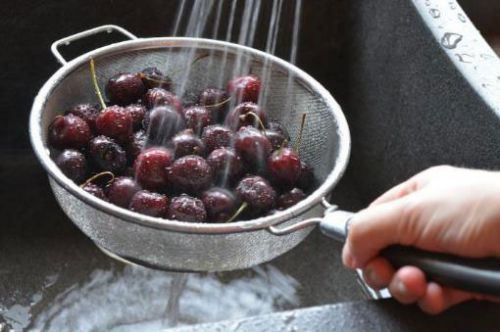
Berries should be well washed before eating
Before you eat this or that product, you should wash it well. To do this, use a laundry soap. The occurrence of allergies can be reduced to zero, if you peel off the berries or fruit.
During the gestation of the fetus, the woman leaves all the strength of the body for its growth and development. Naturally, after the birth the body must be replenished with all the necessary vitamins and minerals. They are found in large quantities in berries. Use them should be with great apprehension and closely monitor the reaction of the child.
It is not recommended to completely exclude berries from the diet, as their components are necessary for maintaining health and immunity. A woman should consult a specialist and take all precautions before using any new food.
After the birth of the baby, as it is known, a special and very strict diet follows, which the newly-made mother must adhere to.
However, her diet should be balanced and varied, so that the newborn receives all that is needed, and therefore it is not superfluous to find out about what fruits can be given to a nursing mother. In this article, we will consider the basic principles of the fruit ration of a young mother, and also protect the baby from possible dangers.
What can be from the fruits of a nursing mother?
What kind of fruit can a newborn baby's breastfeeding mother have? This question many women ask doctors already in the maternity hospital, after all it is necessary not only to restore forces and to fill up vitamin reserves of an organism, but also to give to the kid necessary volume of important substances together with milk.
In fact, fruit with breastfeeding can begin to use the next day after birth - the main thing to know what. Even after cesarean section, despite a strict diet in the first few days, fruits still find their place in the maternity menu.
What kind of fruit can be used for HBV?
Apples
If you just returned from the hospital, it would be most useful to eat apples, especially - baked in the oven. This is not just a delicious treat and dessert, apples that have undergone such heat treatment, perfect the digestion of the mother and even her baby, especially for those women who after constipation are tormented by constipation.
Baked fruit for a nursing mother can be eaten in any amount, and such apples are very useful if you have anemia after childbirth.
In addition, it is the apple recognized by doctors as the safest and most useful fruit that you can eat even for young children with food poisoning.
So, if you do not know what kind of fruit you can with breastfeeding, then a liquid juicy apple is exactly what you really will not hurt.
However, it is important to mention some nuance, which is still adhered to in many domestic maternity hospitals. The fact is that the young mother after the birth is usually advised to consume light fruits, because they are less allergens than fruits with red skin.
Therefore, for the first time it is better to use light varieties of apples - for example, "Golden", "Semirinka" and so on.
Red apples are better when the baby is already a month old.
Dried fruits
Also help for problems with the stomach of the mother and her baby and dried fruit. What kind of fruit can be eaten with breastfeeding to get rid of constipation and resume full function of the intestine?
Try to add prunes and raisins to your diet - on the basis of these dried fruits you can prepare a compote or make an infusion by washing the fruit and stuffing it with boiling water.
Also dried fruit is traditionally considered a dietary food and is better perceived by the organism of the woman giving birth, besides - they are very useful and rich in important microelements and vitamins.
If you include raisins, dried apricots, prunes and dried apples in your diet, you can forget about constipation, abdominal pain, anemia and postpartum weakness forever.
Can I eat fruit when breastfeeding? Certainly! And even necessary, because if you do not adhere to the principles of healthy and proper nutrition, after the birth the body will recover more slowly and worse. So, of course, eat quality and natural fruits if you are breastfeeding.
Allowed fruit when feeding a newborn is practically the entire list, which can be found in a supermarket or on the market, with rare exceptions.
So, useful fruits during breastfeeding are apples, pears, bananas, dried fruits, plums and so on.
But it is important to understand that fruits during breast-feeding should be chosen more carefully than usual, because harmful substances and chemical additives in them can get into the body of your crumbs, along with breast milk.
It is especially important that you buy fruit during the breastfeeding season. Therefore, do not take them, if in nature the harvest time for this type of fruit has not yet come - it, at best, will be brought from the greenhouse and will be completely useless.
What kind of fruit can a nursing woman who does not have an allergy and whose child also does not suffer from it? Here you can try and peaches, and apricots, and kiwi, and any fruit you like, if they are grown in environmental conditions. But just do not rush to pamper yourself immediately and everyone: the nursing mother should know that any new product in the diet is introduced smoothly.
First try a half peach and follow the reaction of the crumbs. If he well tolerated this innovation, then the next day my mother can already try to eat a whole peach. The same applies to any other products, except for dried fruits, apples and bananas.
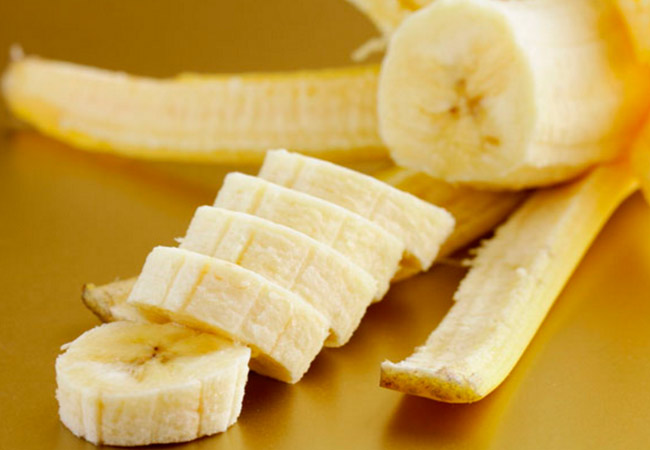
What kind of fruit can you eat a nursing mother, if she recently gave birth? We have already considered this issue earlier, but forgot to mention that a banana is a fruit useful not less than an apple.
Fresh fruit with breastfeeding can be eaten already in the maternity hospital, and one of the best options is the banana. It is perfectly perceived by the organism of the nursing mother, as well as bananas - nutritious and rich in the necessary trace elements food. Like apples, bananas almost never cause allergic reactions, and so even babies are given one of the first banana purees.
The permitted fruits for breastfeeding by months usually look like this:
- first apples and bananas,
- dried fruits,
- then - pears,
- light berries (gooseberries, etc.),
- followed by red fruits,
- after them - berries,
- and then - citrus and exotic fruits.
Note that in the first month after delivery, brightly colored fruits can cause a strong allergic reaction, and therefore they should not be eaten by a newly mum. This applies, in the first place, berries, as well as strawberries.
So if your relatives do not know what kind of fruit you can eat while feeding a newborn, and want to pamper you with a useful treat, warn them about it in advance.
Fruits that can be breastfed during the first weeks after childbirth should have a light - white, green, yellow color. Usually mothers intuitively catch this nuance and avoid trying cherries, cherries, strawberries and other berries.
What kind of fruit can a newborn baby's breastfeeding mother, if after birth has passed several weeks already? Try to bring in your diet a useful garnet - although it has a rich red color, but is often well tolerated by the baby. In the grenade, among other things, contains a lot of iron, but because if you are already tired of eating apples, pay attention to this product.
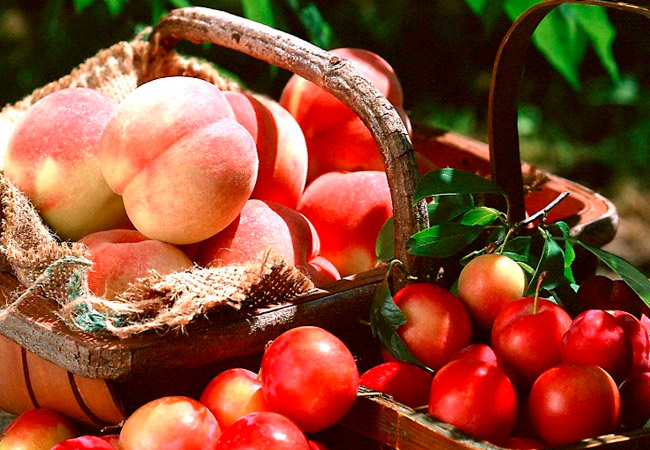
Fruits that are allowed during breastfeeding can be combined with each other and cook dishes, salads and drinks based on them, if your baby has already got to know each ingredient through your breast milk and perceives them well.
If you are afraid of harming your child and do not risk taking fruit for the time being in raw form, you can cook a compote from them. For example, an excellent vitamin drink that does not contain allergens can be obtained from fresh apples, white plums, pears.
Raw fruit with breastfeeding
What kind of fruit can a nursing mother do not need to be pre-processed or baked? A few months after the birth, you can already try peaches, apricots, pears, plums and so on. But remember the advice that we gave above: a new fruit is better to try a little in case if the baby suddenly finds an allergy or intolerance to it.
In fact, fruits like gv, like other foods, are processed by the mother's body, and then the useful substances obtained from them enter the bloodstream. Since it is the mother's blood that is the depot from which the breast milk is formed, the allergen that has got into the blood can reach through the mother's milk and the baby's body.
That's why something should be a little cautious with new types of fruits, especially those that are brought from afar, are exotic for us or have a bright color.
And what can you eat from fruit to nursing mother, whose child is predisposed to allergic reactions? Better the first time to lean only on bananas and apples.
What kind of fruit can be used for lactation, if the child is not prone to allergies, if he rarely has colic and he perfectly perceives new foods that "spoils" mom?
If after the delivery several months have passed, you can try and cherries, and cherries, and peaches, and kiwi, and even grapes. But only gradually and gradually.
Many modern mothers in the house have a special device for feeding the baby with fruits - niblery.
If the child is no longer a newborn, then inside such a convenient device you can also put pieces of fruit - for example, a pear, a banana, an apple.
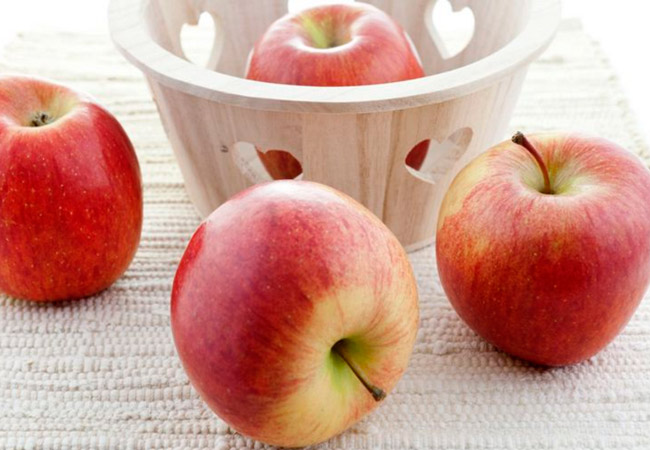
Fruits during breastfeeding in the second month can already have a red and bright color, provided that neither you nor the baby does not have problems with the intestines. If the baby is suffering from an intestinal disorder and the stool is often too thin, then it is better not to enhance this effect and exclude fruits that weaken (for example, plums) from their diet for a while.
Fruits for lactation for the mother of a calm baby, who is not tormented by either colic or diathesis, can be eaten in the usual amount already from the second to the third month after birth.
The main thing here is to follow the reaction of the crumbs. If no side effects after eating a berries or exotic fruit in your food, then there is no need to give up the product.
Fruits during the feeding of the newborn pediatricians are advised to enter this way, avoiding only those products, eating which badly affects the tummy or the skin of the baby. The rest can eat fruits and even need.
So if your baby is already several months old and you can not decide what fruits you can during breastfeeding and which ones are not, then start to try and see which ones the kid perceives best. In the end, the baby is very sensitive to the mother's diet only in the very first weeks after childbirth.
What fruits can be eaten when breastfeeding in raw form
Useful fruit when breastfeeding begins, of course, with an apple: this product will allow you to enrich your body with iron and digestion.
What kind of fruit can be eaten when breastfeeding a newborn? It can be berries, and exotic fruits, if they are of high quality and are environmentally friendly. And also, if your baby does not react to their appearance in your diet, it's the most important thing.
When to introduce fruit when breastfeeding?
In its raw form, you can eat apples and bananas right after delivery. The rest of the fruit is injected smoothly and gradually, one new fruit a day, so that you can immediately recognize the allergic reaction in the baby and understand, through the fault of which fruit it appeared.
Unwanted fruit when breastfeeding
If you are wondering what kind of fruit you can after giving birth to a nursing mother, then know that in the first month of breastfeeding it is necessary to avoid:
- grapes (with the exception of raisins) is very difficult to perceive by the intestines and can lead to increased gas production.The child can also be expressed: the colic may begin or increase, the stool is broken. eat),
- lemons,
- strawberries (many newborns react poorly to this berry and they have red spots on the skin, a chair becomes more frequent),
- raspberries,
- oranges and other citrus fruits (citrus, although very useful, alas, very allergenic, so doctors recommend to abstain for the first month after giving birth to mandarins and oranges)
- blackberries and other berries with a dark color.
The more "dirty" the fruit - the richer it is by allergens, and for a newborn baby it is absolutely undesirable, even if there have never been any allergic reactions in your family before.
However, with time you can try lemons and oranges, since all these warnings concern only the initial stage after childbirth, when it is important to protect the baby from any possible troubles with the tummy, to prevent the development of diathesis.
So, now you know what kind of fruit you can breastfeed and why in the first weeks it is better not to buy and not to eat outlandish foods and those fruits that can cause an allergic reaction in a weak baby.
Every mom wants her child to grow up healthy and strong.
To do this, it is important to adhere to proper nutrition from the first months of life, when the most valuable product for children is breast milk.
However, during the lactation period, many restrictions are imposed on the mother regarding her daily diet.
It is not surprising, because everything that a woman uses, comes into the children's body with milk.
What kind of fruit can a nursing mother? Of course, not all. With their choice, you need to be more careful not to cause the child allergies and intestinal disorders.
Gradual introduction to the diet
Fruits and seasonal berries are a source rich in vitamins and useful microelements. They give mother and child the substances needed to maintain immunity, especially important in the first months after childbirth.
However, immediately after the birth of the child, one must be more careful. Harmless, at first glance, tangerines, can cause the baby allergies. The child's body is not yet ready for experiments, so the fruit should be introduced into the ration of the nursing gradually.
If a woman very much wants to eat kiwi or orange - you can not deny yourself this. The main thing is not to overdo it. When the mother refuses herself in the desired fruit, her body will experience stress. A bad mood will leave a mark on the child. Despite the fact that he is no longer in the womb, he perfectly feels his mother, with whom the umbilical cord was connected for 40 weeks.
What kind of fruit can a nursing mother: the most useful fruits
1. The first fruit that a woman after birth can introduce into her diet is an Apple. There are not very many vitamins in them, but they are absolutely safe for a newborn, they perfectly stimulate the appetite. The first month is desirable not to eat fresh apples, but baked. Then, green varieties are preferred. If the child's organism reacts normally, you can gradually try other types of apples.
2. Grapes. It is very important - what kind of grapes does a woman want. The safest are light yellow and green varieties. That the child did not have colic, it is recommended to use grapes separately from other products.
3. Rich in exotic vitamins kiwi not prohibited to nursing mothers. You need to follow the same rules as with other fruits - eat it in small portions. It is advisable to introduce kiwi into the diet when the baby is three months old.
4. Garnet - this is a real "treasure chest", where there is a huge amount of useful microelements and vitamins, both for the newly-made mother and for the baby. First time, a woman is recommended to eat about 30 grams of pomegranate a day, gradually the norm can be increased. Lovers of pomegranate juice doctors advise to dilute it with water.
What kind of fruit can a nursing mother, and what can not
Doctors believe that a woman in the lactation period can eat absolutely any fruit, if not overdo it with the amount. However, there are some fruits that can not be consumed immediately after birth. They are administered when the child reaches the age of 4-5 months, when the body gets stronger
1. Carefully apply to the draining, since it can provoke diarrhea and colic, not only in the mother, but in the baby.
2. Apricots and peaches lead to bloating. Enter them into the diet with caution should not be earlier than when the baby turns 3 months old.
3. "Red" berries and fruits. Strawberries, cherries, cherries are strong allergens. Their use must be approached with extreme caution. It is not recommended to experiment if the child does not have 4 months. If the child was not allergic to food, a nursing mother might try some strawberries.
4. Any citrus is considered a strong allergen. When you enter them into the ration, do not rush. You can start with a normal lemon, adding it to the tea. In the absence of a negative reaction of the baby's body, the newly mum is allowed to try a piece of orange.
5. Banana is also considered harmless to the child's body. Doctors advise them to use breastfeeding mothers to maintain immunity and stimulate lactation. The acceptable norm is one banana in small pieces throughout the day.
It is important to understand that in the first few months after the birth of the child's body is still very weak. Immunity was not formed, the stomach is not the way to perceive all the food. Any experiments with fruit and berries are not recommended to be performed earlier than the baby will be 3-4 months old. It is advisable to consult a family physician beforehand, he will help to make a proper diet to the nursing mother.
For the first time after labor, the female organism and the child's body need replenishment of the supply of vitamins and minerals, which can be obtained from fruits. In order not to harm yourself and your baby, a woman should be guided by the recommendations of doctors.
1. When introducing a new fruit or berry into the daily menu, the amount of the product should not exceed the allowable norm of 150 grams. In the absence of rash and colic in children, the norm is gradually allowed to increase to 300 grams per day.
2. The first few months after childbirth, it is advisable not to experiment with fruit-allergens. In this period it is better to give preference to apples and pears - they are safe and contain enough vitamins to form a child's immunity.
3. Pineapple is an exotic fruit that is not considered a strong allergen. Despite this, it is not recommended to enter it in the diet, until the baby is 4-5 months old.
What kind of fruit can a nursing mother in the first time after giving birth, and with the use of which it is recommended to wait - a doctor will give a consultation. A woman should remember that bloating in newborns can cause even completely harmless apples if you eat them more than the norm.
Fresh fruit is a source of vitamins and many substances that can help a woman after birth to improve vitality, get rid of the syndrome of chronic fatigue and other problems. A toddler on breastfeeding receives useful substances through milk, contributing to its growth and development.
However, the digestive system of the baby ripens for several months, because the baby's body does not immediately begin to produce the whole set of enzymes peculiar to adults. On the appearance of new components in the diet of a mother, a baby breastfed can react food allergy or a digestive disorder if his body is not ready enough.
For this reason, nursing mother should take care of the selection of fruits for her menu, especially when it comes to exotic fruits. Let us consider in more detail whether a mango can be fed to a nursing mother.
Beneficial features
For tropical countries, mangoes are a common fruit that grows everywhere, like apples in the southern part and middle belt of our country. In those regions where mangoes are grown, fruit is used as a daily food for children and adults, women do not refuse it during pregnancy and feeding of the baby.
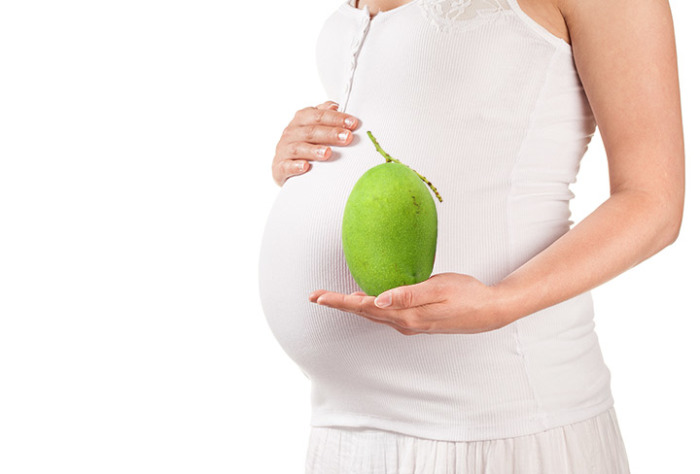
This plant does not require special care, it is sufficiently suitable climate, so fruits can be easily bought in many countries of the world far beyond the tropics. Its popularity in the northern countries is due to its excellent taste and high content of nutrients.
In mango, there are a lot of vitamins and a whole range of important micro and macro elements, the fruit is useful for the developing organism of the newborn and for the nursing mother. First of all, it should be noted the high content of vitamins A, E, C and Group B, as well as antioxidants.
Magnesium, phosphorus, potassium and zinc contribute to the normalization of metabolism during lactation. Iron is required for the body of a mother and baby for good blood formation, mango is especially useful to women after childbirth, if they have iron deficiency anemia.
Fruits of mango tree add energy and strength, which is associated with a high content of sugars. That is why this product is often used as a part of diets for the normalization of vital functions in people in the postoperative period or when exhausted.
Contraindications
With all the positive properties of the fruit, one can not ignore the possible harm that can be caused by the use of the fetus during the period of breastfeeding.

First of all, we are talking about an allergic reaction. The risk is minimal if the nursing mother during pregnancy repeatedly consumed food in mango. In this case, the baby is adapted to a certain extent to the product.
If a woman has never tried fresh mango in her life (not in the packaged juice), do not experiment, introducing this fruit into the diet during lactation. Because there is a possibility that the mother will have an allergy, which will be bad for breastfeeding.
How to choose and consume a fetus
When buying mango, pay attention to appearance and elasticity. The fruit should be fresh, not spoiled, otherwise use will lead to poisoning and upset stomach.
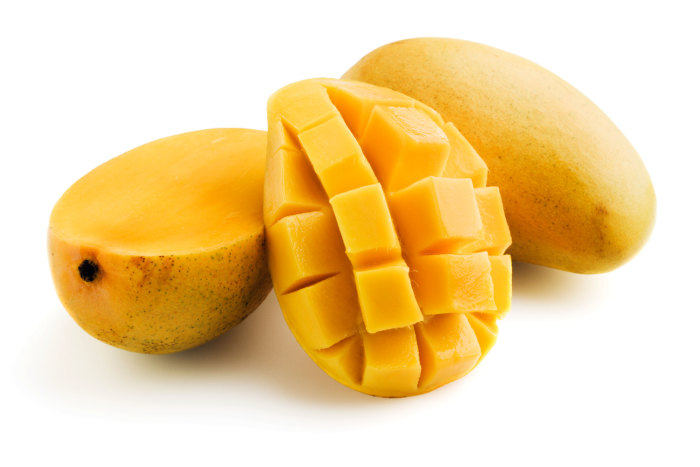
It should be noted that:
- The flesh of the fruit contains poisonous resin, which can not be eaten;
- If you have problems with extra pounds after giving birth, do not eat fruit, they contain a lot of sugars;
- Overeating mangoes leads to indigestion.
To test the reaction of the baby to this exotic fruit, eat a small slice of mango, finishing the morning feeding of the baby. Observe for a couple of days for well-being and behavior. If there are no signs of allergy, a couple of times a week you can afford to eat a fragrant and delicious mango fruit.
Do not abuse exotic fruits - always alternate them with those to which your body has long been accustomed.

